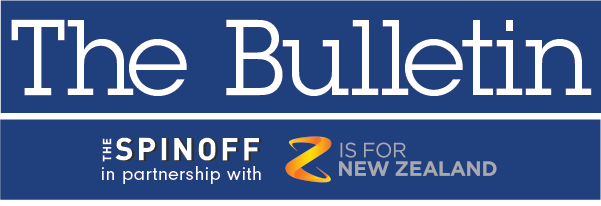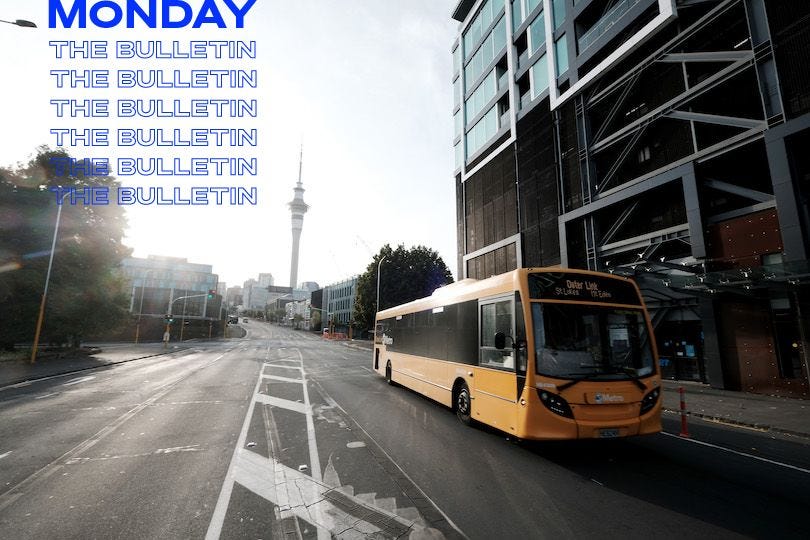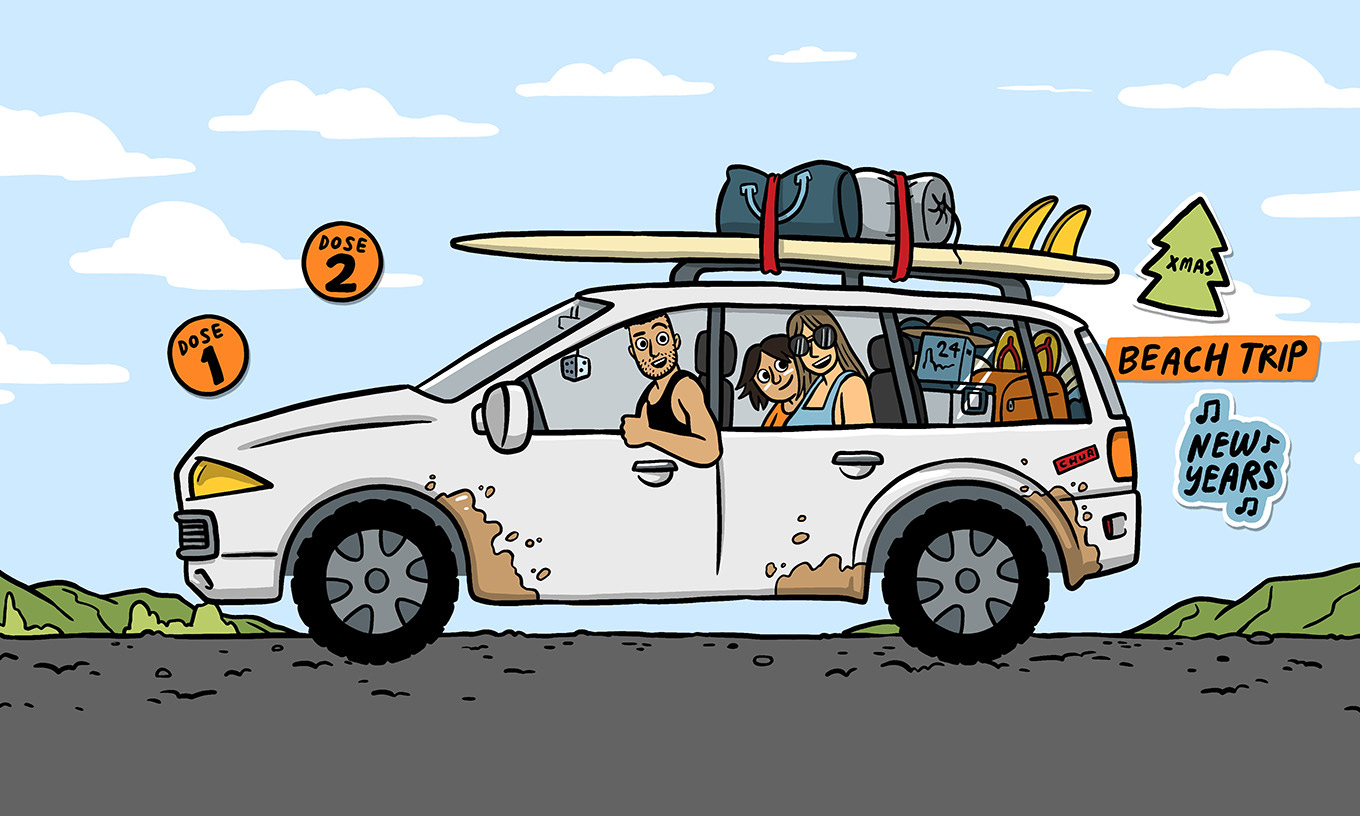Business crunch as lockdown persists
Community cases increase as cabinet meets today, health and business experts call for clarity on the future of the Covid-19 response
Mōrena and welcome to The Bulletin for Monday, October 11, by Justin Giovannetti. Presented in partnership with Z Energy.
In today’s edition: Uncertainty continues over Northland case; Rocket Lab could be breaking the nuclear free law; a global tax deal has been struck; but first, cabinet faces another day of big decisions.
A bus travels a deserted Victoria Street during lockdown. (Bradley White/Getty Images)
Cases continue to trend up a week after the government dropped elimination. Auckland will enter its third month of lockdown this week and epidemiologists say cabinet is unlikely to further loosen restrictions today after case numbers continue to increase. With infections spilling south and possibly north of Auckland, epidemiologist Rod Jackson told Newstalk ZB that he was "freaking out in a major way" about possible spread in unvaccinated swaths of Northland.
Three more epidemiologists from the University of Otago, wrote over the weekend that the country’s strategic response to Covid-19 seems to be drifting and make the case for a move towards tight internal borders to contain the virus. New Zealand isn’t a federation like Australia so it isn’t clear whether the country could move to a patchwork of autonomous regions on a semi-permanent basis.
Auckland’s isolation as a region is having a real impact on business around the country. RNZ reports that retail groups are warning one-third of the country’s business might not survive another year as three regions are now in lockdown. One of the major concerns they voice is uncertainty over the future, with the prime minister resisting calls to set firm vaccination targets to guide business owners for when they should expect to reopen fully. The chief executive of Retail New Zealand called the government’s plan “economic carnage” as frustration drives more heated rhetoric. The Te Aroha Mineral Spas in rural Waikato went from boom year to ledger filled with cancellations, according to Stuff. While the iconic business is confident it will bounce back, it illustrates the struggle others are facing.
The South Island will be looking for clarity as well. While some have written to the Otago Daily Times calling for the South Island to be sealed off from the rest of the country, especially after events like Canterbury’s marquee A&P show were cancelled last week, businesses in places like Queenstown also need tourists to come back, according to the ODT. Half of businesses surveyed in Queenstown warn they won’t make it through the summer unless flights from Auckland can start soon. Businesses note that cancellations flood in after press conferences like the one in Wellington last week where director-general of health Ashley Bloomfield indicated that Auckland’s level three could last another two months.
After a chaotic week of changes to the Covid-19 response, the government now faces pressure to clear things up. First, cabinet will need to weigh the situations in Auckland, Waikato, Bay of Plenty and Northland later today. Each of those are significant calls and there may be tension between public health advice and the politics of ongoing restrictions. RNZ reports that business will be looking for more clarity on vaccine certificates, which were introduced last week without firm details. Also seeking guidance, health experts told One News that a snap level four might become necessary this week in Auckland as cases look ready to take off.
According to Luke Malpass, writing for Stuff, the country is increasingly splitting into two camps: those who want to open up and those who are worried about the costs. The strain of that conflict became clear on the government last week. The prime minister left the capital unannounced on Thursday and her presence at a press conference that day was cancelled at the last minute. Despite touring vaccination sites, her office wouldn’t allow questions over the weekend despite the highest number of community cases detected in over a month. Many will be looking to the Beehive podium today for a return to a clear message.
If you like what you’re reading, we need your support.
A special note from The Spinoff publisher Duncan Greive: Without wanting to get too Bernie Sanders-meme with it, I am once again asking you to consider donating to help The Spinoff in its hour of need.
The delta outbreak struck just as we had made a major investment in new hires to grow what we can bring you on The Spinoff. We now have a head of data creating powerful charts to map the spread of the virus and rollout of the vaccine, a CTO to rebuild our site and upgrade our security and multiple brilliant new writers and editors like Reweti Kohere, Madeleine Holden and Chris Schulz. They are all creating important work under highly constrained circumstances — as are the rest of our 20-strong editorial team. Unfortunately delta has had a significant impact on our partnership work, which makes us more reliant than ever on the support of our audience.
So — if you're part of The Spinoff Members, thank you, from all of us. If you're not, and can donate, please do so today using this link — to keep on keeping on, we need you right now.
(A reminder: Every dollar donated through The Spinoff Members is ring-fenced to create more of our homegrown and independent journalism.)
Northland’s lockdown has sparked a war of words between gang leaders and Winston Peters. The former deputy prime minister went on Newshub to claim without evidence that a positive case who plunged the region into level three was travelling with Mongrel Mob leader Harry Tam. He’s categorically denied the allegation. It’s unclear where Peters is getting his information. What is is clear is that Covid-19 minister Chris Hipkins, during an emergency press conference on Friday evening to announce the lockdown, was frustrated with this latest case. She’s refused to cooperate with health authorities for contact tracing, was hard to track down and travelled to Northland using false documents. A second person with her has evaded contact tracers as well.
The Covid numbers: 56 new community cases were reported yesterday in Auckland, 3 in Waikato and 1 in Bay of Plenty. 61% (20) of the previous day’s total were in the community while infectious. There are now 423 active cases. 81,831 people were vaccinated Saturday.
The Spinoff’s Covid data tracker has the latest figures.
Life with a vaccine passport. Ben, a reader of The Bulletin currently in France, wrote in response to last week’s announcement of a vaccine passport for New Zealand about the situation with the French version, known as a health pass (pass sanitaire):
“We now have a QR code on our phones which we have to show at any restaurant, museum, public venue or to fly. It’s straight forward. It means that we no longer have to keep a record of where we go by scanning QR codes of the places we visit. The important difference is that you can get a health pass for 72 hours by having a negative Covid-19 test. These are done at pharmacies for a fee of 25 euros. This means that unvaccinated people can go places…although at the cost and inconvenience of having tests.”
It’s ‘freedom day’ for the vaccinated in New South Wales. After more than 100 days in lockdown the state is easing restrictions for vaccinated residents, News.com.au reports. Greater Sydney has been in lockdown since June, however more than 90% of residents over the age of 16 have had their first dose now. Vaccine passports will become the norm to enter most hospitality and other venues in the state.
The government has been twice warned that Rocket Lab could be violating the nuclear free law. Helping someone control a nuclear weapon is a crime in New Zealand. As Newshub reports, the committee responsible for advising the government on enforcing the nuclear free law has now told the prime minister twice that Rocket Lab’s launches for the US could be in breach of the law. The rockets aren’t sending nuclear weapons into space, but satellites that help the American military find targets and communicate better. That’s a form of control and the two warnings are a reflection of how wide-ranging New Zealand’s nuclear free law is. All the responses to the warnings so far are concerning. The government says the body, responsible for the law, doesn’t understand it. Rocket Lab’s CEO says it doesn’t launch nukes, which is not the point, and the company’s spokesperson says its rockets don’t help American nuclear capability. A claim that is likely far too definitive. Meanwhile, Rocket Lab is quickly becoming the preferred rocketeer for the US space force, according to dot.LA.
The big issues that could redefine Wellington. Next year’s local elections could be pivotal in shaping the capital for the next generation, the Dominion Post reports. A new council will face a battle between protecting character precincts and more density, a transport system stuck in a debate between cars and mass transit, a central city that is crumbling and seen as unsafe, and a water system that is just truly awful. The coolest little capital has big city problems and small town governance. It really comes down to identity, something that Wellington is struggling with at the moment.
A global deal has set the minimum tax rate at 15%. Over 90% of the global economy has signed onto a deal that will require corporate giants pay a minimum of 15% in tax, Reuters explains. Through shelters, loopholes and accounting tricks, big firms can often dodge paying almost any tax. The world’s finance ministers want the entire thing to be in place by the end of 2022 and start collecting revenue in 2023, which is aggressive for a deal that binds 136 countries together in the face of what is sure to be intense lobbying from some of the richest businesses in the world. New Zealand is a signatory to the deal.
Got some feedback about The Bulletin, or anything in the news?
Get in touch with me at thebulletin@thespinoff.co.nz
Right now on The Spinoff: Siouxsie Wiles & Toby Morris tackle the questions you might have about the vaccine and summer. Craig Renney writes that the evidence shows there’s no downside to raising the minimum wage. Toby Manhire looks back at last week as one where the country’s world-beating Covid response lost its way. Reweti Kohere explains how you should and shouldn’t use your face mask. Chris Schulz reports that the country’s vinyl boom went bonanza over lockdown.
All Whites back in winning form after Covid forced them from the field. The team won 2-1 over Curaçao on the weekend in Bahrain following a two-year hiatus from international play caused by the pandemic, Stuff reports. The national football team beat the outfit from the Dutch Caribbean island, found off the coast of Venezuela, but had to play a defensive game at the end to hold onto victory.
That's it for The Bulletin. If you want to support the work we do at The Spinoff, please check out our membership programme.







